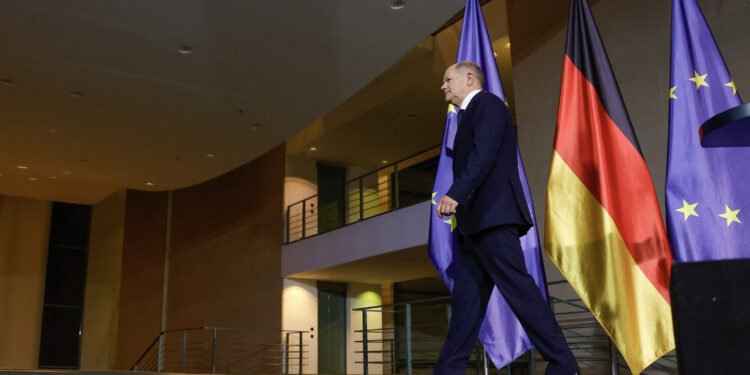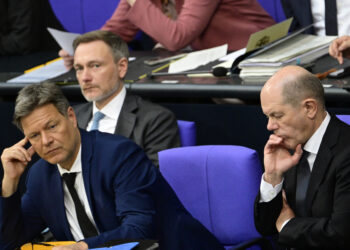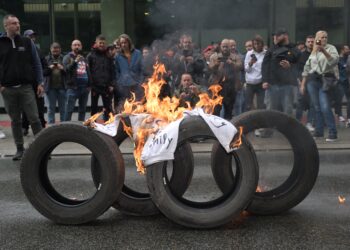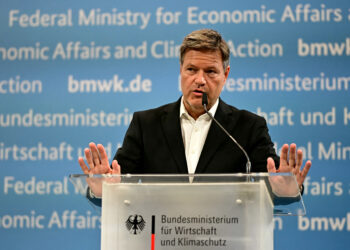Brussels – In the end, German Chancellor Olaf Scholz’s balancing act to hold his governing majority together was not enough. The “traffic-light coalition” that, for the first in the history of the Federal Republic, brought together his Social Democrats (SPD), the Greens, and the liberals of the FDP has finally shattered, as the distances between its unlikely partners were so irreconcilable. Thus, having sacked the finance minister who had set off the government crisis, Scholz announced that as early as next January, the Bundestag would have to rule on confidence in his executive, which has now become a minority government. If withdrawn, Germans could go back to the polls in the spring.
Scholz fires Lindner
The rift came on Wednesday evening (Nov. 6), after a last emergency meeting between the leaders of the majority — the so-called traffic-light coalition, from the colors traditionally associated with its members: the red of the Social Democrats, the yellow of the Liberals and the green of the ecologists — that was not enough to avoid the inevitable. Scholz met with his two deputies, Liberal Finance Minister (as well as leader of the FDP) Christian Lindner and Economy Minister Robert Habeck (who is rising within the Green Party), but had to take note of the vast distances between their respective positions.
Therefore, the chancellor had no choice but to discharge Lindner, causing the collapse of the coalition. The third leg of Berlin’s government will now withdraw its four ministers from the cabinet (excluding the head of Transport, Volker Wissing, who announced he wants to remain within the executive and has therefore left his party), leaving Scholz at the head of a minority executive comprising the SPD and the Greens. One of the chancellor’s closest men, Jörg Kukies, will replace Lindner. He is a former Goldman Sachs man who already served as secretary of state for financial and European policies in Angela Merkel‘s last executive, a “grand coalition” between the center-right CDU/CSU and the SPD.
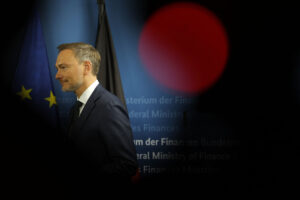
“I was forced to take this step in order to avoid harm to our country,” Scholz said Scholz in front of reporters, attacking with unusual fervor the “petty political tactics” of his former minister, who he said showed a level of selfishness that was “completely incomprehensible.” Lindner “has shown no willingness to implement any of our proposals,” the chancellor continued, referring to the mediation attempts he carried out together with Habeck. He supported the expulsion of the FDP leader: “The chancellor’s decision was logical,” the ecologist vice-chancellor said this morning (Nov. 7), calling Scholz’s choice “consistent and necessary.”
A crisis foretold
This showdown was certainly no surprise. Ever since the laborious formation of the coalition executive in the fall of 2021, the partners of the majority fought time and time again, especially on economic and financial issues. Greens and Social Democrats, both center-left, advocate a central role for the state in the economy, to be carried out through big investment plans (including debt) and a certain level of tax levy on finance, among other things, generous social programs and ambitious climate policies. The FDP, on the other hand, is a rigorist about public finance management: it vigorously defends the “debt ceiling” found in the German Constitution and would like to reduce taxes (especially for businesses) while keeping state intervention in the economy to a minimum.
The situation has worsened with the onset of the Russian invasion of Ukraine, with the historic November 2023 ruling of the Constitutional Court that created a 60 billion euro hole in the federal budget, the worsening of the country’s energy and economic crisis, and finally, with the elections in the eastern Länder of Saxony, Thuringia, and Brandenburg, which have seen a resounding defeat of all three governing forces. These developments led relations to sour more and more, to the breaking point.
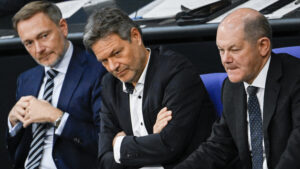
That came as the two vice-chancellors proposed diametrically opposed plans to revive the German economy, which has been in deep crisis for two years. The breaking point would be the impasse over the negotiations for the 2025 budget, around which the FDP and the SPD-Green axis found themselves on opposite sides for the umpteenth time. Lindner refused to comply with Scholz’s demand to declare a state of financial emergency that would allow them to circumvent debt ceiling rules so as to send new aid to Ukraine and increase the defense budget, the two most pressing priorities business since Donald Trump‘s re-election to the White House. In order not to issue new debt, liberals want to take money for military spending from social programs, an impassable red line for the other two governing partners.
Early Elections
Historically, minority executives in Germany are short-lived. It is unlikely to be different this time, considering the numbers at the Bundestag: the SPD and Green parliamentary groups will not be able to sustain government action on their own. Every time, they will have to turn to other political forces to push through their legislative proposals. But none of these seem intended to extend a hand to the moribund Scholz cabinet. This means, among other things, that Europe’s leading economy is in danger of going into a provisional financial year from next January if no party backs the Scholz-Habeck-targeted 2025 budget proposal.
The chancellor announced that he intends to appear in the House for a confidence vote in mid-January. If he loses it (as seems to be a foregone conclusion) the President of the Republic, Frank-Walter Steinmeier, can dissolve Parliament within some 20 days of the no-confidence vote and convene new elections within 60 days: thus, in the first week of April at the latest (the natural end of the legislature would be September). However, Berlin is unlikely to have a fully functioning government before the summer, if not the fall. In the history of the Bundesrepublik, there have been only three early elections: in 1972, 1983, and 2005.
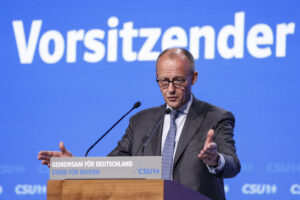
The opposition –from the radical left of Die Linke to the new red-brown party led by Sahra Wagenknecht, from the Christian Democrats of the CDU/CSU to the ultra-right of the AfD – have welcomed the end of the Scholz government, and are already pushing to go to the polls even before next spring. Projections in hand, the new German executive will be led by the Conservatives of the CDU/CSU, the most powerful party within the European Populars (and from which Ursula von der Leyen also is a part), which in the hands of leader Friedrich Merz is moving increasingly to the right. It will then be to be seen whether the Union will govern on its own or whether it will seek support (perhaps outside) from the neo-Nazis of the AfD, who have been on the rise for years (and made a splash at the last Europeans) but against whom a strong cordon sanitaire still applies in Germany; At least for now.
English version by the Translation Service of Withub